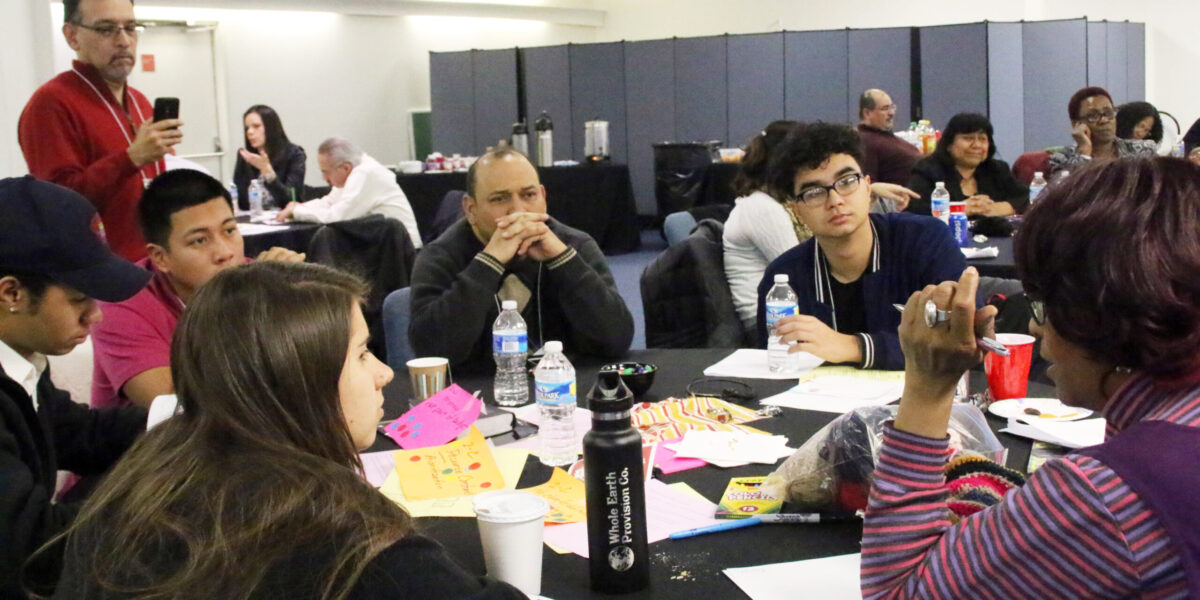(Mennonite Church USA/Mennonite Mission Network/Mennonite Education Agency) — Following up on the fifth annual Hope for the Future (HFF) gathering, the event’s planning committee has sent policy solutions and recommendations to leaders of Mennonite Church USA institutions to recruit, retain, train and educate board and staff members to undo racism and advance intercultural transformation.
The "Intercultural Competence Call to Action" was sent Apr. 25 to board chairs and presidents/heads of the denomination’s churchwide agencies and educational institutions as well as to the nearly 60 people who attended the Jan. 21–24 HFF gathering in Hampton, Virginia. Participants at the gathering worked at generating strategies and best practices to bring about positive change.
"This work is necessary due to the very long history of racism/marginalization of people of color that necessitates continuing to work on becoming an anti-racist church," noted planning committee members in a letter accompanying the call to action. "We also want to continue to prepare for the future generation of leaders of color in a church that will fully accept them."
At HFF events, people of color who are leaders in Mennonite churches, institutions and agencies can network and strategize with each other and with leaders who are White. The January gathering focused on human resources to increase Racial/Ethnic diversity among Mennonite Church USA leaders, noting that people of color have experienced barriers in church institutions throughout the years.
The document’s plan for action and accountability calls for:
- Boards, agencies and institutions to use a tool such as the Intercultural Development Inventory (IDI) to provide a benchmark and a way of tracking improvement in intercultural competence for all members.
- Organizations to provide anti-racism/intercultural competence training for new board members and both new and current employees, and additional training for employees 18–24 months later.
- Organizations to assign mentors for new leaders/board members of color.
- Organizations to provide implicit bias training to hiring committees before search processes are initiated.
- Organizations to expand their representation of people of color in high-impact positions to reflect the composition of their constituencies.
Planning committee members acknowledged that church institutions have been working on becoming anti-racist and interculturally competent workplaces for varying lengths of time, and affirmed what has already been accomplished.
"We also recognize that because we have not had a system-wide plan, our effectiveness has been limited," they noted, adding that taking steps to implement the recommendations will demonstrate each organization’s commitment to transformation.
They encouraged the institutional leaders to examine which policies they already have in place and whether their policies and practices match, to identify which pieces still need to be implemented and what is needed for that to happen, and to select an evaluation tool to monitor progress.
Before the 2017 HFF gathering, the leaders will receive a questionnaire asking which practices they have implemented as well as what they are finding hard to implement and why.
"We’ll look to the responses not as a way to ‘judge’ institutions, but to help us figure out how we can continue to work for systemic change across the church," said Iris de León-Hartshorn, director of transformative peacemaking for Mennonite Church USA and a planning committee member.
The committee members also will develop questions to guide the institutional leaders in reporting back at the 2017 HFF gathering, and plan to work with them on their accountability/evaluation models.
"Changing our institutional cultures and becoming an anti-racist church is difficult," they observed. "Our assurance that it’s possible is our belief in a God who can do all things and has provided us a vision of the church in Revelation 7:9."
"I’m grateful for the commitment and passion many people within the church have shown for this work, and that we can walk with each other in times of celebration and difficulty," added de León-Hartshorn.
HFF gatherings are sponsored by Mennonite Church USA, Mennonite Education Agency, Mennonite Mission Network, Everence, and Mennonite Central Committee. The planning committee includes Michelle Armster, executive director of Mennonite Central Committee (MCC) Central States; de León-Hartshorn; Stanley W. Green, executive director of Mennonite Mission Network; Gilberto Pérez, Jr., senior director of intercultural development and educational partnerships at Goshen (Indiana) College; Carlos Romero, executive director of Mennonite Education Agency; Noel Santiago, a LEADership minister for Franconia Mennonite Conference; and Regina Shands Stoltzfus, assistant professor of peace, justice and conflict studies at Goshen College.
See the letter and call to action online.







